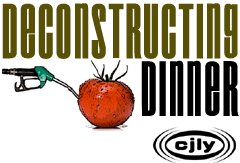
[Editor's note: This is a summary of a podcast you can download or listen to from this page.]
The Livestock Lost series examines the farming and business of meat, dairy and egg production. It explores the known and unknown dangers of meat production and what people can do to source alternatives to what many would refer to as a cultural staple of the North American diet.
In the third installment of the series, "Local Meat? Not in My Backyard?" continues with our examination of how one community is responding to more restrictive slaughterhouse regulations in the face of increasing demand for safe and humanely-produced local meat.
Right now, it is illegal to purchase locally raised and slaughtered meat within many regions of British Columbia. Our focus on the response in the West Kootenay region of the province provides a great example of how such a project may be received if proposed in other North American communities.
While the critical questioning of any proposed development in a community is indeed a healthy process to undertake collectively, it became clear on part two that much of the opposition to the abattoir were emotional responses of fear that led to condemning instead of questioning.
Part three presents an even greater focus on one of the most important concerns for any community: water. It was this very concern over water that acted as one of the major setbacks to the slaughterhouse proposed in the Slocan Valley.
Guests/voices
Kenyon McGee, spokesperson, Slocan Valley Abattoir Co-operative (Winlaw, B.C.) -- Kenyon is a lawyer with Kenyon McGee Law Corporation and has been involved with the abattoir co-operative since it was first formed in 2007. He has lived in the area for 30 years and has had experience raising and butchering livestock.
Marilyn Burgoon, director, Slocan Valley Watershed Alliance (Winlaw, B.C.) -- The Slocan Valley Watershed Alliance is a non-profit society formed in 1982. The SVWA is a coalition of local watershed groups from the communities of Hills to South Slocan. Since its formation, the alliance has worked to protect water quality, quantity and timing of flow. The alliance opposed the proposed abattoir in the Slocan Valley.
Bruce Davidson, vice-chair, Concerned Walkerton Citizens (Walkerton, Ont.) -- Since 2000, Bruce has been publicly speaking on the Walkerton water contamintaion tragedy that took the lives of seven community residents and made 2,500 ill. The contamination was the result of a complex series of events that began with E.coli entering into the public drinking-water supply from a cattle farm. Bruce sits on the board of the Canadian Environmental Law Association and is involved in his local source protection board.
Audio clips
"Tar Sands and Water," produced by Macdonald Stainsby, Dru Oja Jay and Maya Rolbin-Ghanie.
Voices: Celina Harpe, elder, Fort MacKay First Nation (Fort MacKay, Alta.); Morris McDonald, Fort MacKay First Nation (Fort MacKay, Alta.); George Poitras, Misikew Cree First Nation (Fort Chipewyan, Alta.); David Schindler, professor, biological sciences, University of Alberta (Edmonton, Alta.)
Related Tyee stories:
- Slaughterhouse Rules
Podcast: 'Deconstructing Dinner' explores the rumours and fears stalling plans for a co-op abattoir in the Slocan Valley. - Don't Modify My Milk
Podcast: 'Deconstructing Dinner' on how ice cream giant Unilever is keeping Canadians off dairy. - The Co-op Alternative
Podcast: 'Deconstructing Dinner' looks at community farming in BC.
Read more: Food, Deconstructing Dinner, Environment














Tyee Commenting Guidelines
Comments that violate guidelines risk being deleted, and violations may result in a temporary or permanent user ban. Maintain the spirit of good conversation to stay in the discussion.
*Please note The Tyee is not a forum for spreading misinformation about COVID-19, denying its existence or minimizing its risk to public health.
Do:
Do not: